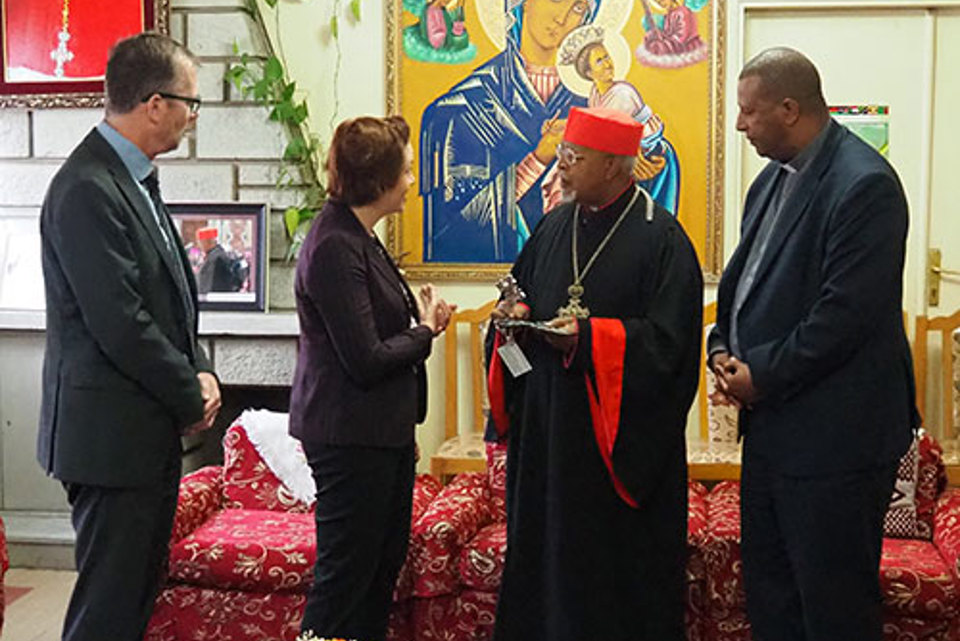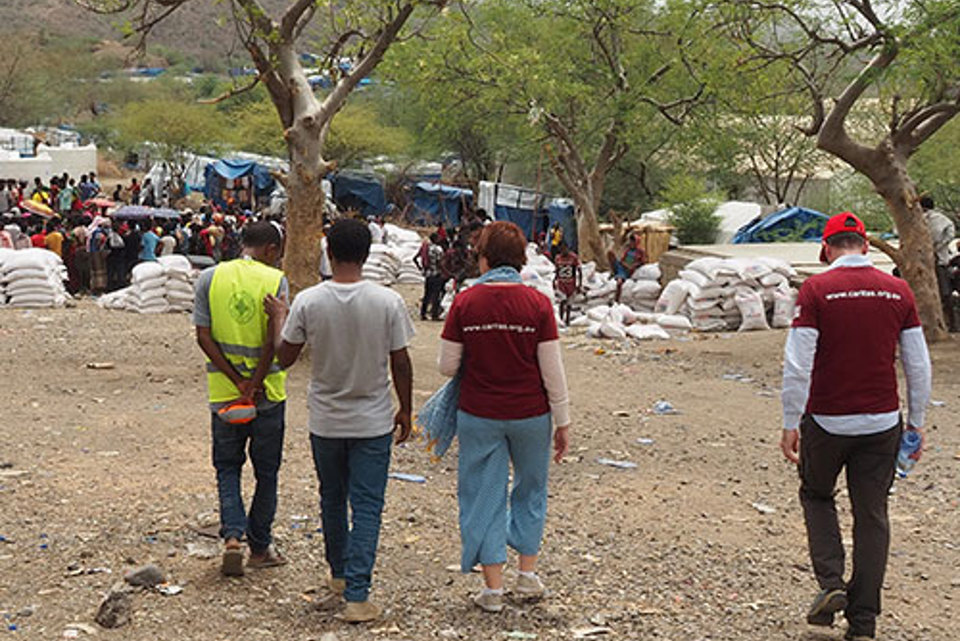
Kirsty and Richard with Cardinal of Ethiopia. Photo: Caritas Australia.
Last month, my colleague Richard Landels, Advancement Director, and I embarked on a 10-day journey to Ethiopia, after being invited by His Eminence Cardinal Berhaneyesus Demerew Souraphiel to visit during his travels to Australia.
It had been over a decade since I was last in Ethiopia, and whilst change was indeed apparent in the growing number of cars and tall buildings in the capital, in many ways things remained just the same – the warmth and hospitality of the people, the gorgeous Meskel square and the vibrancy of a country that was never colonised.
On one of our first days of our stay, we met with Cardinal Berhaneyesus Demerew Souraphiel to scope the level of need in the country, and to discuss the work of Caritas Ethiopia’s protection programs and the importance and value of vocational programs. He welcomed us so warmly and with open arms, and for that we will be eternally grateful. I was incredibly moved by his genuine interest in our wellbeing for the entirety of our stay, as he would constantly check in on us to ensure we were feeling safe.
We travelled to the north of Ethiopia, where we visited an Internally Displaced People (IDP) camp and met with the camp leaders. They explained to us some of the difficulties that residents of the camp experience in their day-to-day lives. How they only receive half the amount of food required to live. How they have no money or the means to earn or produce a sustainable income. How they cannot leave the camp to trade and how little prospect there is for them to return to their homes in the foreseeable future.

Kirsty and Richard at IDP camp. Photo: Caritas Australia.
The imminent need for humanitarian assistance seemed even more evident in the remote and drought-affected communities we visited in the south. This meant travel on dirt roads, and after dirt roads had long ended. We saw community after community in desperate need of food and water – some of which have experienced a drought, a flood, a locust outbreak and another drought all within the same year. Their resilience seemed worn down. A tired resignation etched in their faces.
It was difficult for us to stand in these communities knowing that they are unsure when their next meal would come, and words cannot begin to describe how great the need is. We spoke to families who were now eating one meal a day. Families that would drink water that was dirty and contaminated, knowing that it would make them sick but not having another choice.
Currently, over 81.6 million people are facing acute food insecurity across eastern Africa – a number so unfathomably large, and one that I find deeply distressing. When I look at these statistics and when I reflect upon my time in Ethiopia, I think of all the children experiencing malnutrition, I think of all the mothers facing desperation as they are unable to feed their child, I think of all the hardship that the people of Africa are facing and find it near impossible to not fall into despair.
My visit to Ethiopia, whilst confronting at times, truly solidified my desire to make a difference, and how pivotal it is for Caritas Australia to continue our mission to provide assistance and support to those affected by the food crisis.
Even though it was truly heartbreaking for us to witness the struggle that the people of Ethiopia are currently facing, seeing the work of our partners, Caritas Ethiopia, as well as the determination of the Catholic Church in accessing the most marginalised and the poorest of the poor, was indeed a glimmer of hope. It was reassuring to see that they are there to support people during the darkest of times.

Today more than ever, Caritas Australia stands in solidarity with Caritas Ethiopia and the people of Africa, with unconditional support. During this time of need and in the future.
I would like to take this opportunity to thank you for helping us achieve our mission and to encourage you to donate to our Africa Food Crisis appeal. Your generosity can make a world of difference in the lives of those being affected by the food crisis.
With gratitude,
Kirsty Robertson.

















